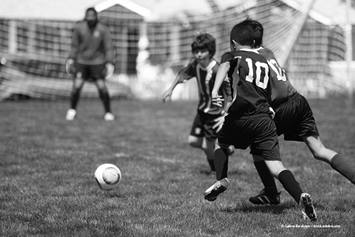Attention Deficit Hyperactivity Disorder (ADHD)
What Are the Symptoms of ADHD?
Some symptoms of Attention-Deficit/Hyperactivity Disorder (ADHD) must appear by the time a child is 12 years old, though they are often noticed soon after a child starts school. One out of 12 children have ADHD. It is diagnosed more often in boys than in girls, though this difference goes away by adulthood. Children with ADHD may be bright and creative, but may have trouble with learning or behavior.
There are many symptoms of ADHD. Not all the behaviors listed are present in every child.
- Is easily distracted and forgetful
- Has trouble following directions, needs a lot of supervision
- Often seem not to hear when spoken to directly
- Has trouble concentrating
- Notices everything but cannot focus on a task
- Is not able to "tune out" background noise
- Has trouble sticking with an activity
- Makes careless mistakes
- Has trouble organizing work
- Will not go back over his or her work to check it
- Does not finish tasks
- Has trouble shifting from one task to another
- Is messy, disorganized and loses things
Impulsivity
- Acts before thinking
- Has trouble waiting their turn
- Calls out in class
- Overreacts and is quick-tempered
- Is easily frustrated
Hyperactivity
- Runs or climbs excessively
- Is always "on the go"
- Has trouble sitting still, gets out of their seat in school
- Talks too much or makes too much noise such as humming or singing
Other Problems That May Go Along with ADHD
- Deals poorly with a change in routine
- Has trouble making and keeping friends
- Shifts activity quickly
- Cries easily
- Can develop poor self-esteem
- Lies and argues often
Possible Causes of ADHD and How the Diagnosis Is Made
The cause of a child’s ADHD is not always clear, but it seems to run in families. There are no blood tests or other medical tests to diagnose ADHD. The diagnosis is made using a variety of tools to gather information about how the child behaves and performs with others at home and at school. Among these tools is a questionnaire parents, caregivers and teachers will be asked to fill out.
Some other testing may be needed to rule out learning disabilities or problems with vision and hearing. Your child’s health care provider will do a medical exam to find out if other problems are present.
Treatment of ADHD
Your child's health care provider will work closely with you to help manage your child’s ADHD and medicines may be prescribed to reduce symptoms. You may also work with a provider to use behavioral strategies to help your child function better at home and school, in spite of their ADHD symptoms. A combination of medicine and behavior management is typically the suggested course of treatment.
Medicines can help reduce the symptoms of ADHD but may also have side effects. Some of the most common medicines used are Concerta®, Medadate CD®, Adderall XR®, Vyvanse®, Intuniv® and Strattera®. It may take a few tries to find which one and what dose works best for your child. Also, the amount may need to be readjusted from time to time. Some of these medicines are “controlled” and cannot be refilled automatically. For those medicines, you will have to get a new prescription from your child’s health care provider each month.
Things You Can Do to Help Your Child
At School:
- You may need to talk with the teacher, principal, guidance counselor and nurse to be sure your child's learning needs are met.
- Let the teacher know what things help them to stay focused. For example, ask that your child be seated close to the front of the class and away from windows or other distractions.
- Your child may have behavior problems in the classroom. The school may need to develop a behavior plan or other specialized supports for your child.
- Your child may need special tutoring. Do not be afraid to ask for that help if it is needed.
- Encourage activities your child can excel in, such as sports, art, music or hobbies. Extracurricular activities with kids of the same age are often very important for social development.
At Home:
- Supervise homework time. Clear your child's desk and remove distractions, such as TV, video games, phones, and other electronic devices.
- Help your child create a system of organizing what they need to do. For example, teach them to use an assignment book or to make a “to do” list with due dates and then help them use these tools regularly.
- Set up daily routines. They will give your child structure and a feeling of security.
- Help your child develop and maintain a healthy self-esteem. Accept them for who they are. Focus on their abilities, strengths and good traits rather than on their shortcomings. Praise them for good behavior.
- It is likely you will need to find ways to motivate your child to complete tasks they find hard or boring, such as chores, homework and hygiene activities. Using frequent, low cost rewards, such as access to screen time, is advised.
- Set your child up to succeed. Give them tasks that they can handle, a little at a time. A job well done boosts the child's self-esteem.
- Work on changing only one or two negative behaviors at a time.
- Explain rules clearly and be consistent. Tell your child what will happen if the rules are broken. Write down the rules or have them repeat them to you.
- Have fun with your child. Play with them. Love them.
- Take care of yourself. If you start to lose patience, take a break. If you notice you struggle with some of the same behaviors as your child, consider talking to your health care provider about these concerns. They can determine if you could also have ADHD. When a parent’s ADHD is well treated, the parent can better support the child.
Long-Term Effects of ADHD
By working closely with your child's health care provider and teachers, you can help your child be healthy and successful. Most children do not "outgrow" ADHD. But with the help of supportive adults, your child can develop positive self-esteem and succeed in life.
Additional Resources:
CHADD (Children and Adults with Attention Deficit/Hyperactivity Disorder) is a national organization that gives support through advocacy and education. Their website, www.chadd.org, has many useful materials, including information on educational rights of children with ADHD.
You can also sign up for the ADHD Academy education classes offered by Nationwide Children’s Hospital at www.nationwidechildrens.org.
Helping Hands Patient Education Materials
Written and illustrated by medical, nursing and allied health professionals at Nationwide Children's Hospital, Helping Hand instructions are intended as a supplement to verbal instructions provided by a medical professional. The information is periodically reviewed and revised to reflect our current practice. However, Nationwide Children's Hospital is not responsible for any consequences resulting from the use or misuse of the information in the Helping Hands.
HH-I-157 ©1992, Revised 2021, Nationwide Children’s Hospital



